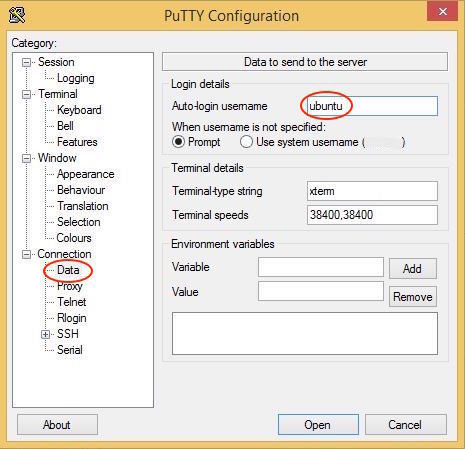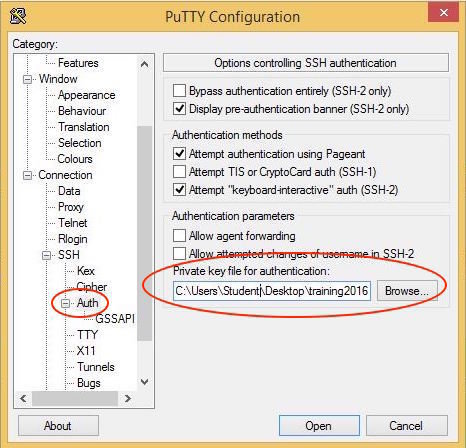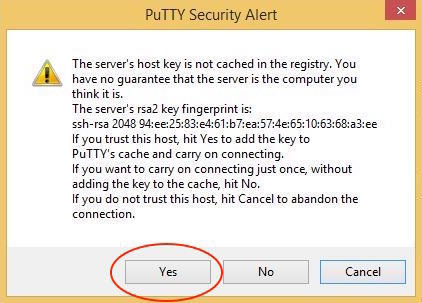Getting Started
June 13-15, 2017
iRODS User Group Meeting 2017
Utrecht, Netherlands
Jason M. Coposky
@jason_coposky
Executive Director, iRODS Consortium

Getting Started

Little Slips of Paper & Dependencies
curl -LO https://github.com/irods/irods_training/raw/ugm2017/training.pem
chmod 600 training.pem
ssh -i training.pem ubuntu@#.#.#.#
Logging in to your VM:
Install iRODS Build Requirements:
sudo apt-get update
sudo apt-get -y install git g++ make python-dev help2man unixodbc libfuse-dev libcurl4-gnutls-dev libbz2-dev zlib1g-dev libpam0g-dev libssl-dev libxml2-dev libkrb5-dev unixodbc-dev libjson-perl python-psutil python-jsonschema super python-exif odbc-postgresql

Little Slips of Paper & Dependencies
- Download Putty http://www.putty.org/
- Download Private Key https://github.com/irods/irods_training/raw/ugm2017/training.ppk
- Open Putty
- Enter Username
- Select Private Key
- Enter Target Host Name (or IP address)
- Save Session, Connect! (click Yes at the first-run Security Alert)
Windows (using Putty):

Little Slips of Paper & Dependencies
Open Putty


Little Slips of Paper & Dependencies
Enter Username


Little Slips of Paper & Dependencies
Select Private Key

C:\Users\Student\Desktop\training20

Little Slips of Paper & Dependencies
Enter Host Name (or IP address)
Name Session
Save Session
Open Connection


Little Slips of Paper & Dependencies
First-Run
Security Alert


Little Slips of Paper & Dependencies
Google Chrome can also connect via "Secure Shell" extension:
https://chrome.google.com/webstore/detail/secure-shell/pnhechapfaindjhompbnflcldabbghjo
Download public and private keys:
https://github.com/irods/irods_training/raw/ugm2017/irodstraining
https://github.com/irods/irods_training/raw/ugm2017/irodstraining.pub
Then:
- Install extension
- Open New Connection
- Enter "ubuntu@#.#.#.#"
- Import public/private keypair (select both files at the same time)
- Connect!

Acquire the Prerequisites
Clone the training repository:
git clone https://github.com/irods/irods_training

Install and configure Postgres
ubuntu $ sudo apt-get -y install postgresql
ubuntu $ sudo su - postgres
Prepare database system for iRODS use:
postgres $ psql
CREATE DATABASE "ICAT";
CREATE USER irods WITH PASSWORD 'testpassword';
GRANT ALL PRIVILEGES ON DATABASE "ICAT" to irods;
\q
postgres $ exit

Configure the Repository, Install, Run setup
wget -qO - https://packages.irods.org/irods-signing-key.asc | sudo apt-key add - echo "deb [arch=amd64] https://packages.irods.org/apt/ $(lsb_release -sc) main" | \ sudo tee /etc/apt/sources.list.d/renci-irods.list sudo apt-get update
sudo apt-get -y install irods-server irods-database-plugin-postgres
Install public key and add repository:
Install from repository:
Read more: https://packages.irods.org
sudo python /var/lib/irods/scripts/setup_irods.py < /var/lib/irods/packaging/localhost_setup_postgres.input
Run setup with provided input file:

What to Consider in an iRODS Deployment
Things to consider
- Number of users and expected simultaneous connections
- Expected ingest rate
- Sizes of files
- many small
- Partial read / write vs whole file usage
- Replication for durability
- Replication for locality of reference
- Load balancing vs High Availability
iRODS will run on a laptop or a rack of servers

Upgrading Large Installations
Things to consider
- Database Snapshots
- Attempt a graceful grid-wide shutdown ahead of time
- Test Zones - do not upgrade blindly
- Conformance Tests - try your edge cases
- Federated Zones - how mixed is your deployment
Maintenance Window
- In the Lab:
- PostgreSQL 9
- 10M Data Objects
- VM with 10GB RAM, 4 VCPUs, Rotational Disk
- Upgrade from 4.1.8 to 4.2.0 took 13 minutes
- Estimate:
- 100M Data Objects to take ~2-3 hours

Questions?

Anatomy of an iRODS installation
/etc/irods/core.* - iRODS Rule Language
/etc/irods/database_config.json - database configuration /etc/irods/host_access_control_config.json - hostname filtering
/etc/irods/hosts_config.json - local /etc/hosts style configuration
/etc/irods/server_config.json - primary server configuration
/etc/irods/service_account.config - service account information
/usr/bin/* - iCommands
/usr/sbin/irodsAgent
/usr/sbin/irodsPamAuthCheck
/usr/sbin/irodsReServer
/usr/sbin/irodsServer
/usr/sbin/irodsXmsgServer
/var/lib/irods - service account home directory
/usr/lib/irods/plugins - plugins location

Introduction to iCommands
iRODS command line equivalent to standard Unix operations
- ils
- icd
- ipwd
- iput
- iget
- irepl
use -h to get help with any particular iCommand
ihelp will show all available iCommands

Questions?

UGM 2017 - Getting Started
By iRODS Consortium
UGM 2017 - Getting Started
- 3,759

